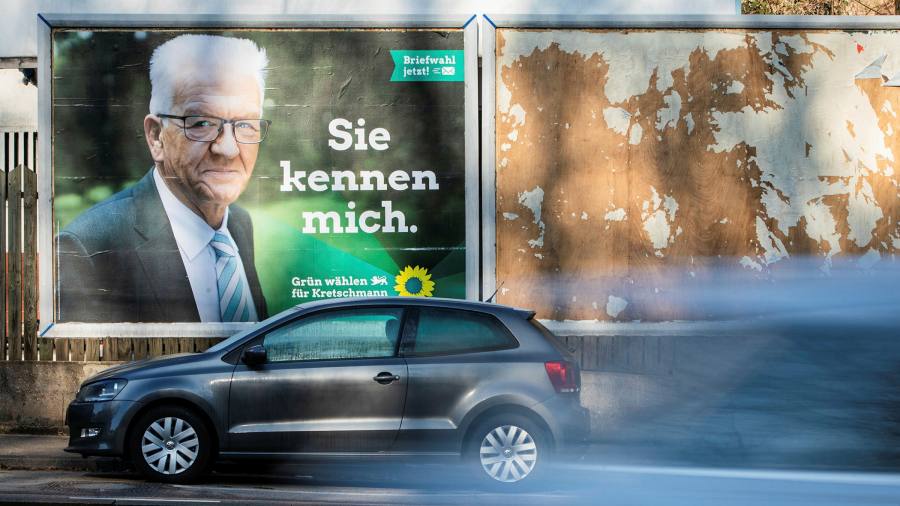[ad_1]
Germany’s Greens made history five years ago when they beat all other parties in a regional election for the first time. Now they’re hoping a second victory in the same state will cement their reputation as the coming force in German politics.
Voters in the affluent south-western region of Baden-Württemberg will elect a new local parliament next Sunday, and the Greens are on course to triumph again. According to one recent poll they will take 35 per cent of the vote — way ahead of any other party and better than their strong result in 2016.
The vote marks the start of one of the busiest electoral years in recent German history. Polls are taking place in six states while Bundestag elections in September will decide who succeeds Angela Merkel, the veteran chancellor.
The Greens hope a win in Baden-Württemberg will build momentum towards a strong showing in September and their return to national government after 16 years in opposition.
“It’s the only state where we have a prime minister so, strategically, we need to defend that position,†said Franziska Brantner, an MP for the Greens in the Bundestag who herself hails from Baden-Württemberg. “It shows we can be the party that governs,â€
Yet anyone hoping a Green victory in the state will be replicated on a national scale may be disappointed. Much of the party’s unique success in Baden-Württemberg hinges on the popularity of one man — Winfried Kretschmann, the veteran Green politician who has led the regional government for the past 10 years.
A silver-haired, slow-talking 72-year-old, he was a leading figure in the “realo†or moderate wing of the Greens that ultimately triumphed over the “fundis†or radicals in the 1980s. Respected by eco-warriors and conservatives alike, he enjoys 70 per cent approval ratings, and has come to symbolise a party that no longer talks ideals at the fringe but speaks directly to Germany’s middle-class.Â
“People see Kretschmann as serious, honest, and sympathetic,†said one Green official in the state capital, Stuttgart. “He has become hugely popular here, especially in the last five years.â€
Home to Daimler, Bosch and Porsche, Baden-Württemberg is Germany’s “autoland†and was for decades a stronghold of Merkel’s centre-right Christian Democrats. But power shifted to the Greens in 2011 as Japan’s Fukushima disaster fuelled a massive backlash against nuclear power. Local anger over Stuttgart 21, a controversial €8bn rail project also helped the party, whose Baden-Württemberg branch also had the reputation of being more pragmatic — and so more electable — than Greens elsewhere.
That image was reinforced when in 2016 the Greens teamed up with the CDU to form a government in the state. The idea had initially seemed outlandish. “We’d built few bridges at that point, and suddenly we had to come together and forge a coalition,†said state minister Theresa Schopper. In the end, though, she said they had managed to make compromises far more easily than either expected.
The CDU, too, has been pleased with the coalition. “It’s been very quiet, stable. It’s governed with a lot of sound judgment and common sense,â€Â said Manuel Hagel, the CDU’s secretary-general in Baden-Württemberg. “The Greens are a reliable partner for the CDU. I can see it working well on a federal level, too.â€
The Greens say the coalition is proof you can successfully marry environmental policies with economic prosperity. “The economy has not gone bust [under Green leadership],†said Sandra Detzer, co-chair of the Greens in Baden-Württemberg. “We’re not all just wearing our eco-shoes. Baden-Württemberg is still a strong industrial location, an innovation location — and maybe a role model for combining economy and ecology.â€
That message has proven persuasive. Membership of the party in Baden-Württemberg grew by 60 per cent over the past five years, Detzer said. It is also growing across Germany.
However, Peter Matuschek, chief political analyst at pollsters Forsa, said the Greens’ southwestern success was not necessarily transferable to the rest of Germany. Elsewhere, he said, many voters suspect the Greens are more left-leaning and activist on climate goals.
“Kretschmann has been able to win over a good portion [of Christian Democrats] in Baden-Württemberg, but they would not automatically turn to the Greens on the national level,†he said.
Nevertheless, for Frank Brettschneider, a communications analyst from the University of Hohenheim, Baden-Württemberg sends a signal to the wider German public about the Greens’ seriousness. “By winning the election there, the Greens can make it clear they can also win when it’s not just about environmental issues or climate protection,†he said.
The Greens’ national leadership has also tried to broaden the party’s appeal by projecting a more mainstream image. They have slightly softened their rhetoric on climate policy, for example, saying Germany should try to “get on the path†of limiting global warming to 1.5 degrees, as the Paris climate deal recommends, but not insisting on it.
These moves have angered some younger Green supporters and activists, who set up an alternative “Climate List†for state elections, including those in Baden-Württemberg. The initiative is unlikely to take a large chunk of Green voters but it’s enough to put the party leadership on notice. Some observers expect tensions between the Greens’ activist base and its more pragmatic leadership to persist way beyond Sunday’s election.
But despite those tensions, the Greens are aiming high — from Baden-Württemberg to Berlin. “We want to sit at the steering wheel, making sure this car is moving in the right direction,†Schopper said.
Additional reporting by Guy Chazan
[ad_2]
Source link






